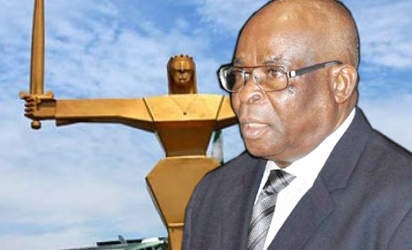A prominent Igbo socio-cultural group, Nzuko Umunna, has condemned the move by the Code of Conduct Bureau (CCB) to prosecute Chief Justice of Nigeria, Walter Onnoghen over alleged non-assets declaration and money laundering.
The group’s condemnation was conveyed in a Sunday statement jointly signed by the Coordinator, Mr. Ngozi Odumuko and General Secretary, Mr Paschal Mbanefo, and emailed to The Herald.
According to the group, although the Chief Justice of Nigeria is not above the law, the circumstances of his planned prosecution reek of executive over-reach and is inconsistent with constitutional and other legal provisions.
The statement read, “We received with shock the planned arraignment of the Chief Justice of Nigeria, Honourable Justice Walter Nkanu Onnoghen (GCON) before the Code of Conduct Tribunal.
“One of the cardinal principles of the rule of law is that no-one is above the law. Accordingly, the planned arraignment of the Chief Justice of Nigeria ought ordinarily not to elicit raised eyebrows.
“However, the circumstances of this planned trial leave much to be desired, not least because the trial may occasion clear constitutional breaches. In particular, sections 153(1), 271 (1), 292(1)(a)(ii) and Paragraph 21 of Part 1 of the Third Schedule to the 1999 Constitution are to the effect that any judicial officer accused of an offence must first be subjected to investigation and disciplinary action by the National Judicial Council (NJC) prior to any trial.
“This position of the law has been validated by the Court of Appeal in the famous case of Ngajiwa vs FRN (2017) LPELR-43391(CA). Clearly, this condition precedent has not been met in Onnoghen’s case, therefore indicating that the case is both inchoate and dead on arrival.
“For a regime that prides itself in the promotion of rule of law and combating of corruption, it leaves much to be desired that the planned trial is being orchestrated in the media alongside a motion to force out the Chief Justice of Nigeria even in the face of such glaring constitutional breaches and non-compliance with the dictates of the rule of law. This gives vent to speculations that this trial is more about regime sustenance than any anti-corruption fight.
Read Also: CJN’s trial may end up as a “prosecutorial misadventure,” says Falana
“What is more, while President Muhammadu Buhari (GCFR) rejected the Electoral Act (Amendment) Bill on the ground that signing it was too close to the elections, the Federal Government seems to have looked the other way in this regard, given the potential hiccups that may be thrown up by the trial of the Chief Justice of Nigeria at this most inauspicious time.
“Also, given the crucial role the Chief Justice of Nigeria is constitutionally mandated to play post-general elections, the planned trial again gives vent to the growing perception that, having perhaps failed to intimidate the judiciary through the ill-advised nocturnal raids on judges’ residences by the Department of State Security (DSS), this is yet another attempt at breeding a malleable judiciary.
“The speed with which the petition against the Chief Justice of Nigeria was treated cannot be lost on any discerning observer. While the petition which triggered the charges was received by the Code of Conduct Bureau (CCB) on 9th January, 2019, the charge was promptly drafted the next day – a record 24 hours. It is recalled that the case of alleged corrupt practices against former Secretary to the Federal Government, Mr. Babachir Lawal, is still pending with the Economic and Financial Crimes Commission (EFCC) several months after he was indicted by a panel chaired by the Vice President, Prof. Yemi Osinbajo. The same is true of the indictment of the Special Assistant to the President on Prosecution and Chairman, Special Presidential Investigative Panel for the Recovery of Public Property, Chief Okoi Obono-Obla by several entities – including the National Assembly – over alleged forgery of his West African Examinations Council (WAEC) certificate. While Obono-Obla remains untouched, the former Secretary to the Federal Government is even a prominent member of the Buhari Campaign team. This again raises serious concerns on whether the planned trial of the Chief Justice of Nigeria does not foster issues of double standards.
Read Also: Activists remanded in prison for demanding N50m bribe to stop EFCC’s probe
“It is also recalled that while sundry appeals were made to Mr. President to forward Justice Onnoghen’s name to the National Assembly for confirmation as Chief Justice of Nigeria, it took then Acting President Osinbajo to do so.
“Accordingly, we condemn unequivocally the planned trial of Justice Onnoghen and demand that it should be halted forthwith.
“We urge the Federal Government to take immediate measures to stall any steps that may unduly overheat the system and imperil national peace and security.
“We advise the government to guarantee adherence to the rule of law and separation of powers which are cardinal principles for the advancement of democratic governance. It is noteworthy that a similar trial of the head of the legislature failed spectacularly, even while the security agencies are still targeting some vocal elements of that arm of government.
“The Buhari Administration must not give the impression that it wants to cling to power other than by fair means. Let due process reign.”




 Premier League
Premier League